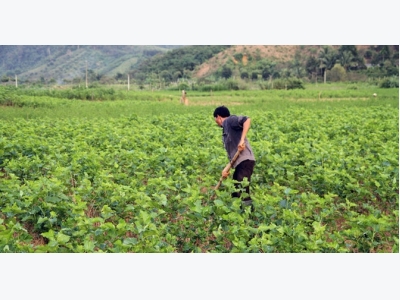Vietnams sericulture industry in danger from China businesses

Chinese businesses have been flocking to Vietnam, competing with Vietnamese enterprises to collect materials, causing a material shortage.
Out-of-date machines have also been entering Vietnam through different ways.
According to the Vietnam Mulberry Association, the mulberry & silk industry has recovered strongly from the recession since 2007.
There are 200 silkworm breeding households in Vietnam, including 150 in Lam Dong, and 40 automatic silk reeling systems. The figure is expected to increase to 50 by the end of the year.
The current development is a great challenge, however, because of the imbalance between equipment and the material growing area.
Chinese businesses have been flocking to Vietnam, competing with Vietnamese enterprises to collect materials, causing a material shortage.
Dang Vinh Tho, chair of the Vietnam Mulberry Association, said with the average yield of 30 tons per hectare, the total output from the existing 7,000-8,000 hectares of mulberry area in the country is not enough for the operating machines.
In Vietnam's kingdom of mulberry and silk industry- Lam Dong - alone, there are 15 automatic silk reeling businesses, which can churn out 2 tons of silk daily, and 20 mechanical silk reeling units each of which produce 1 ton of silk.
While producing silkworm eggs is an important link in the mulberry & silk production chain, no Vietnamese enterprise provides eggs. Silkworm eggs are imported from China across the border gates and they do not undergo plant/animal quarantine.
Also according to the mulberry association, Vietnam has to import nearly 1,000 tons of silk cord from China and Brazil to do outsourcing for the Matsumura Company from Japan.
However, analysts say the biggest risk for the industry is from China.
Pham Phu Binh, director of Phu Cuong Mulberry in Bao Loc City, noted that old machines in China have been sold in Vietnam through different ways, leading to an imbalance in supply.
Chinese businesses have been flocking to Vietnam, where they have set up silk reeling factories, collecting materials at sky-high prices.
While the market price is just VND140,000 per kilo of cocoon, Chinese pay VND170,000 in their competitive scramble for materials with Vietnamese enterprises.
Tho said the high prices paid by Chinese businesses benefits farmers, but there are risks.
“They (Chinese businessmen) pay high prices to collect all materials and drive Vietnamese enterprises away. When Vietnamese enterprises give up, they will force the prices down and farmers will suffer,” he warned.
An analyst said that Vietnam has attracted Chinese businesses because Vietnam’s silk exports to India are exempt from tax, while Chinese bear the tax rate of 15 percent when exporting to the market. Chinese are trying to take full advantage of the ‘Vietnamese origin’ to enjoy tax preferences.
Related news
 Japan enters local agriculture scene
Japan enters local agriculture scene The Vietnam-Japan business co-operation in the agricultural sector is flourishing.
 High time for high-tech farming in Vietnam
High time for high-tech farming in Vietnam Deputy Minister of Planning and Investment Dang Huy Dong speaks to Vietnam News Agency about all these issues.
 Vietnam exports 2.3 million tons of rice in first five months
Vietnam exports 2.3 million tons of rice in first five months Vietnam exported 2.3 million tons of rice worth US$1 billion in the first five months this year, a year on year increase of 1.6 percent in volume & 1.2 percent